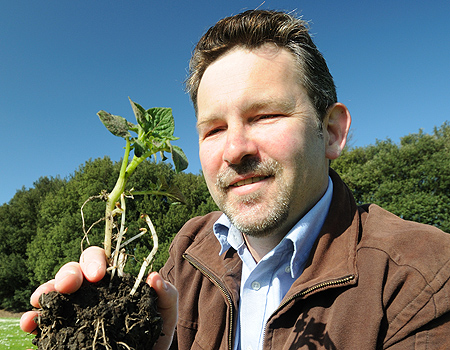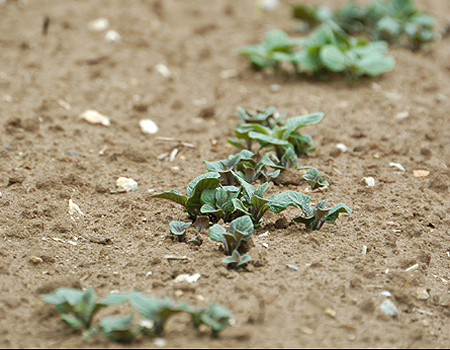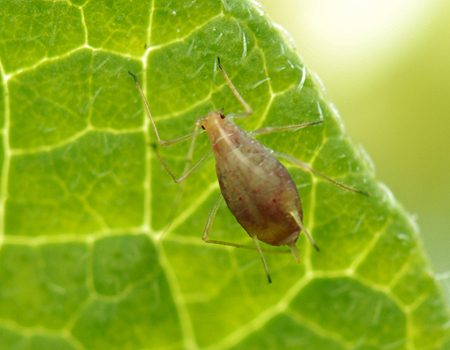New Actara in-furrow treatment targets early aphid activity

A revolutionary new in-furrow application of Actara insecticide at the time of planting could give seed potato growers over five weeks post-emergence aphid control. Early control of aphids with Actara gives the opportunity to reduce the risk of virus transmission in seed potato crops.
The unique in-furrow treatment has gained approval in time for this season’s seed crop planting in Scotland and the north of England. The technique has been used to great effect by Dutch seed potato growers, where trials have shown very good levels of aphid control 40 days after emergence, when aphid populations on untreated plants were multiplying rapidly.
Highly systemic Actara is rapidly taken up by the establishing crop and moves into new growth as plants emerge. Aphids feeding on treated plants will be quickly killed, to prevent further damage and limit the spread of virus infections.
Research has shown potatoes are especially vulnerable to virus infection during the early growth stages. However, targeting very early foliar applications when there may be less than 20% ground cover is difficult and potentially wasteful. In-furrow Actara treatment could give greater flexibility in the timing for the start of the foliar spray programme.

Syngenta Insecticides Technical Manager, Michael Tait, warns seed potato plants can be rapidly infected with non-persistent viruses, such as PVA and PVY, by species of aphids migrating through the crop. Cereal aphids are now known to be important vectors for these viruses, when control with Actara would prevent them moving on to infect other plants.
Existing foliar treatments have been very successful in significantly reducing persistent viruses, such as PLRV, but the non-persistent viruses have remained stubbornly high, reports Mr Tait. Over recent seasons up to 25% of seed crops entered for certification in England have been rejected for virus infection, with 90% of the cases testing positive being non-persistent viruses.
An Actara trial organised by Scottish Agronomy in 2009 suffered high levels of infection in the untreated plots, but over 40% less infection was seen in plots treated with Actara at planting and supported with a robust foliar treatment from six weeks after first emergence. The trial, planted with PVA infector plants to create an artificially high risk situation, experienced a surge of virus transmitting Grain Aphids just four weeks after the crop reached full emergence, and typically before most growers would have started foliar applications.

Mr Tait highlights that where the start of the foliar application was delayed for eight weeks post emergence, the levels of virus in the trial was unacceptably high. "The results reinforced the need for foliar treatments, but the in-furrow treatment buys growers time and greater flexibility with the early applications," he advises. "It remains imperative that growers maintain their foliar treatments to minimise the risk of virus spread."
To ensure the resistance-busting activity of Actara continues to control all aphid species, Mr Tait advocates growers should use a different insecticide group for the first foliar treatment, where Hallmark with Zeon Technology would be a good choice. A further Actara foliar application is permitted in seed crops, which he advises will be best used towards the end of the season.
Scottish Agronomy potato specialist, Eric Anderson, believes the in-furrow Actara application could prove a valuable start to the insecticide programme in seed crops. "If we can reduce the early aphid movement with the in-furrow Actara treatment, there is a better chance that the subsequent season-long control programme can achieve the desired result," suggests Mr Anderson.
"Growers must remain vigilant for signs of aphid activity in the crop, or warnings from aphid monitoring programmes to start foliar programmes. Our trials have once again identified the importance of pyrethroids, such as Hallmark Zeon, for knocking down aphid populations and minimising the risk of virus transmission throughout the season."
The Scottish Agronomy trial confirmed there were no adverse effects on crop vigour or establishment from the in-furrow treatment. The approved dose rate is 100 g of Actara per hectare applied in the planting furrow. Application can be carried out using the type of equipment originally developed for in-furrow application of Amistar.
In-furrow Actara is approved for potato seed crop production only.
For further information visit www.syngenta-crop.co.uk








